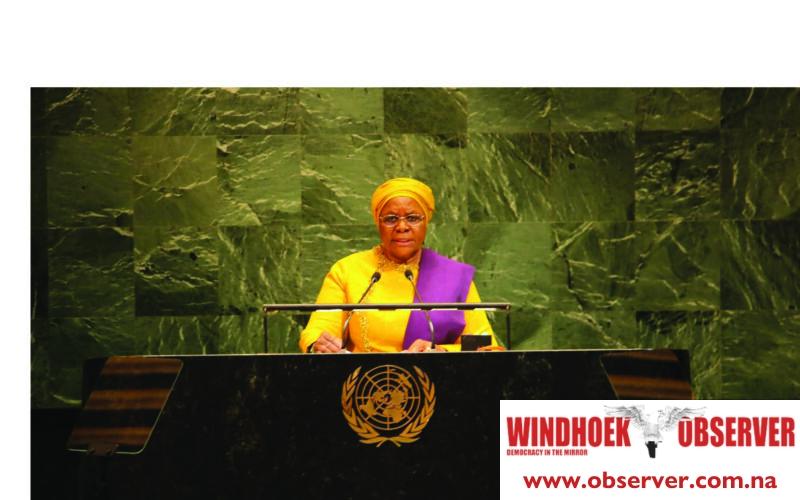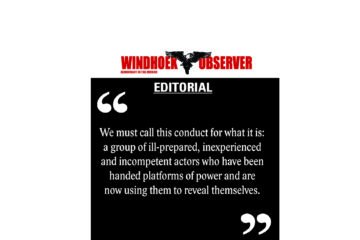In a poll, many of you told the Young Observer what you expected President Netumbo Nandi-Ndaitwah to include in her maiden speech before the United Nations General Assembly on 24 September 2025; you hoped she would focus on Namibia’s economic and development priorities and give attention to youth empowerment and employment. On that day in New York, she delivered a speech that carried both symbolic resonance and concrete policy ambition. For young Namibians, it signals not only promise but also responsibility.
The speech opened with history and humility. Nandi‑Ndaitwah reminded the world that Namibia’s independence, achieved through the tireless petitions of our forefathers such as Dr Sam Shafiishuna Nujoma, under apartheid-colonial rule, is one of the UN’s success stories. She reflected on her personal journey with the UN, which began in 1974, and emphasised service to Namibia and Africa.
“Even the smallest nations have a voice. When these voices are heard and heeded, durable peace and justice will prevail.”
For young Namibians, this should be inspiration that our voices, ideas and actions are central to shaping Namibia and the world’s path forward.
The President directly tied her address to NDP6, launched in 2025. She framed Namibia’s development within the African Union Agenda 2063, SADC plans and the UN 2030 Sustainable Development Goals. The theme of her administration, “Unity in Diversity, Natural Resources Beneficiation, and Youth Empowerment for Sustainable Development”, is a blueprint for inclusion, growth, and resilience.
Economic transformation was front and centre. She highlighted the need for value addition in agriculture, mining, energy and fisheries, aiming to move Namibia away from raw commodity dependency toward industrialisation and high-value sectors. If implemented properly, this is quite critical, as it could translate into jobs in technical sectors such as engineering, innovation and technology.
“Namibia’s 8th Administration is built on the strong foundation and legacy of our predecessors… That theme aims to shape and transform the Namibian economy through value addition.”
Youth-focused commitments were specific and actionable. The National Youth Fund, already operational and capitalised to support entrepreneurs, was highlighted as a cornerstone of empowerment. In education, she committed to abolishing registration and tuition fees in public institutions and vocational centres, a direct alignment with NDP6’s goals of broadening access to quality education and skills development.
“Our objective is to maximise the potential of Namibia’s youth population to drive sustainable socio‑economic development through youth empowerment, sport development, and the culture and creative industry.”
The President emphasised that infrastructure, logistics and energy are not just buzzwords, but they are tools for empowerment. She painted a picture of Namibia as a regional logistics hub, with modernised transport, ports and corridors linking the landlocked neighbours to the coast. For youth, that means opportunities in logistics, transport management, warehousing, digital mapping and regional trade.
Energy is another sector with transformative potential. Namibia’s strategy includes diversifying the energy mix, harnessing all natural resources, and presenting the Energy Compact at the Africa Energy Forum, unlocking concessional funding for national initiatives. Renewable energy, green tech and emerging energy sectors are now viable arenas for youth to claim jobs, start enterprises and innovate sustainably.
“Climate change is scorching our lands and drying up our rivers… Namibia calls for the implementation of the provisions of the ‘Namib Declaration on a Stronger, United Nations Convention to Combat Desertification, for a Land-degradation Neutral World.’”
This indicates that the government is serious about linking climate resilience, energy, and economic opportunity. Young Namibians could literally be shaping a greener future while creating livelihoods.
The speech was not just inward-looking. President Nandi‑Ndaitwah stressed that Namibia’s growth and youth development are linked to global justice and multilateral cooperation. She tackled pressing international issues such as reforming the UN, ending illegal sanctions on Cuba, Zimbabwe, and Venezuela, and advocating for Palestinian self-determination.
“The unprecedented human suffering of the people of Palestine should question our human conscience… What we need is constructive dialogue to prevail.”
Her point is that nations like ours must be heard, and young Namibians must understand that global inequities affect domestic opportunities, from markets to scholarships to foreign investment.
This diplomacy is connected directly to NDP6’s pillars, which emphasise regional cooperation, investment attraction, and sustainable economic growth. A robust global engagement framework opens doors for youth internships, exchange programmes, and partnerships in emerging sectors.
Nandi‑Ndaitwah also sent a strong signal about gender equality. Namibia’s cabinet currently has 57% women, reflecting ongoing progress in women’s decision-making. She reaffirmed commitments to the Women, Peace, and Security agenda, including hosting high-level events and advocating through the Namibia International Women’s Peace Centre.
“As a woman, I encourage every girl and woman by affirming that your voice matters. Your vision is needed, as it will pave your way to the helm of whatever institution.”
For youth, the lesson is clear: inclusion is a prerequisite for impact. Girls and young women, in particular, are invited to lead, innovate, and participate at every level of decision-making.
This speech is both declarative and instructive. It is a reminder that youth are no longer spectators. Here’s what to watch for, on the basis of the speech:
- Follow-through on NDP6 commitments:Are youth funds, infrastructure projects, and vocational programmes implemented on the ground?
- Opportunities in new sectors: Renewable energy, creative industries, logistics, and green tech are growing. Position yourself early.
- Accountability and transparency: Ensure that funds and programmes reach intended beneficiaries, not just a few urban or connected elites.
- Global connections: Scholarships, technical support, and partnerships will likely increase; young people must claim them.
Unlike a generic speech, this one lays tracks for action, making it clear that youth engagement is not optional but central to Namibia’s growth trajectory.
While a speech can inspire, it does not exactly deliver results. Execution is everything. Here’s where NamYouth can be strategic about influencing execution:
- Track progress. Monitor NDP6 implementation in your sector or region. Ask questions and demand updates.
- Engage locally. Identify how national policies filter down to schools, workshops, communities, and start-ups.
- Innovate and participate. Opportunities are available for youth who innovate, create enterprises, or contribute to renewable energy and value addition will be best positioned.
- Hold decision-makers accountable. Transparency is a right, not a favour. Youth engagement ensures funds and programmes meet promises.
President Nandi‑Ndaitwah’s UN address sends a message loud and clear: Namibia is ambitious, inclusive and determined. Young people are central to that ambition. The stage is set, the plans are mapped, and the international community is watching. Now it’s up to you to take the baton.
“We have an opportunity to restore hope, to build a future defined not by division, but by unity and preservation of human dignity.”




